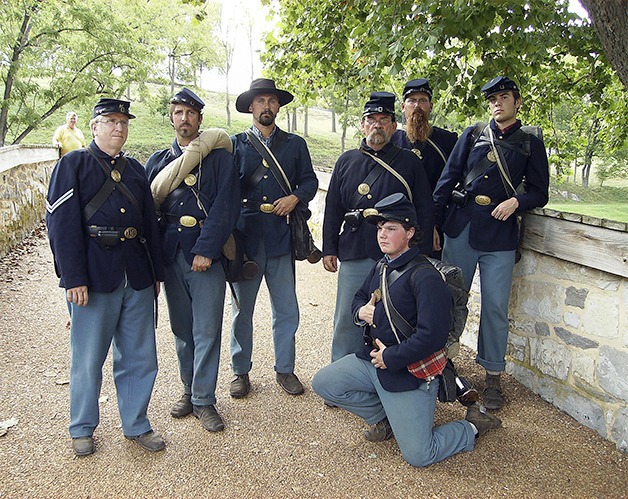It may look like a group of people “playing army” at Rotary Park this Saturday, Sept. 6. It may even sound like it, if the Washington Civil War Association re-enactors get city permission to fire—black powder only—their muskets that day. It is, in fact, a fun day for the participants, but it could be the start of something much bigger.
Paul Timmerman, dedicated Civil War re-enactor and member of the WCWA board, is hoping that this living history demo will attract enough attention and interest for him to bring his hobby home.
“We (want to) re-enact a Civil War battle, so there would be muskets blazing and cavalry,” he said in a recent phone interview.
The Snoqualmie man is asking both his association and the city of Snoqualmie for the OK to host a battle re-enactment in August, 2015, at Meadowbrook Farm. He has previously coordinated re-enactments at Fort Steilacoom and Port Gamble, and says the Valley’s beautiful setting and proximity to the freeway make it a good location for an event.
“Personally, I think that Snoqualmie is going to be very attractive and the (attendance) numbers will be at the high end,” he said. Also, because of Meadowbrook’s flat terrain and surrounding mountains, “I suspect there will be a nice echo effect” from any artillery shots.
What’s planned
Nothing will echo, though, until both the association board and the city of Snoqualmie approve the event. Timmerman is optimistic that the WCWA will give its approval this fall.
“This one already has a lot of support from multiple members and the board,” he said.
He’s generated enough interest from the membership that he’s had to limit the size of the demo Saturday. Since the events are entirely volunteer, he’s not sure how many people will be there, but he’s expecting up to 15, mostly from his command, 20th Maine, Company F of the Union Army.
“We’ll set up our tents, do some drills and interact with the public,” he said. They’ll be wearing heavy wool uniforms and still heavier one-shape-fits-all shoes while they do it, and will probably enjoy every minute of it. “I don’t care if not one person stops, because they’re going to see us,” Timmerman said.
Of course, he really does hope people stop to learn about what they’re doing.
The actual re-enactment is likely to be 10 times the size, with up to 150 soldiers, plus civilians, he estimated.
Now, if the uniforms (from Civil War patterns), the shoes (they have to be worn into lefts and rights), and the expensive musketry don’t convince you that they are serious about staying true to history, then watch the drills. They’re often from a surviving troop manual of the time. Or, count the stars on the U.S. flags they carry. You’ll come up short because in 1860, before the 11 southern states seceded from the Union to create the Confederacy and launch the Civil War, the United States numbered only 33.
Washington wasn’t yet in the Union, so when the WCWA formed in 1997, the re-enactors did their research and named their military units using the same conventions of the actual Union and Confederate troops. No battles were fought here, which allows the group to get creative in their re-enactments, but it’s all done with history in mind.
“It’s fun re-enacting the Civil War, don’t get me wrong there, but it’s really about engaging with the public and getting them to know what this was really all about,” Timmerman said.
His own company, in reenactments of the Battle of Little Round Top, July 2, 1863 at Gettysburg, Penn., individually take the names of men who fought in that battle, which turned the tide of the war. They research their soldiers and model their stories at events, because “our unit is very committed to keeping memories going.”
Their reasons vary. In Timmerman’s opinion, “The civil war, relative to U.S. history was the defining moment of the country… It set us on a path that we’re living on today. You can’t really understand the U.S. unless you understand the Civil War.”
The not-for-profit WCWA is focused on education, and does many school visits. The education, though, is often incidental to experiencing life in the 1860s.
“It’s really kind of good theatre, too,” he said.
• Learn more about the Association on their web page, http://wcwa.net/

Union soldiers, including some Washington men with the Washington Civil War Association, prepare to charge in a battle re-enactment.


